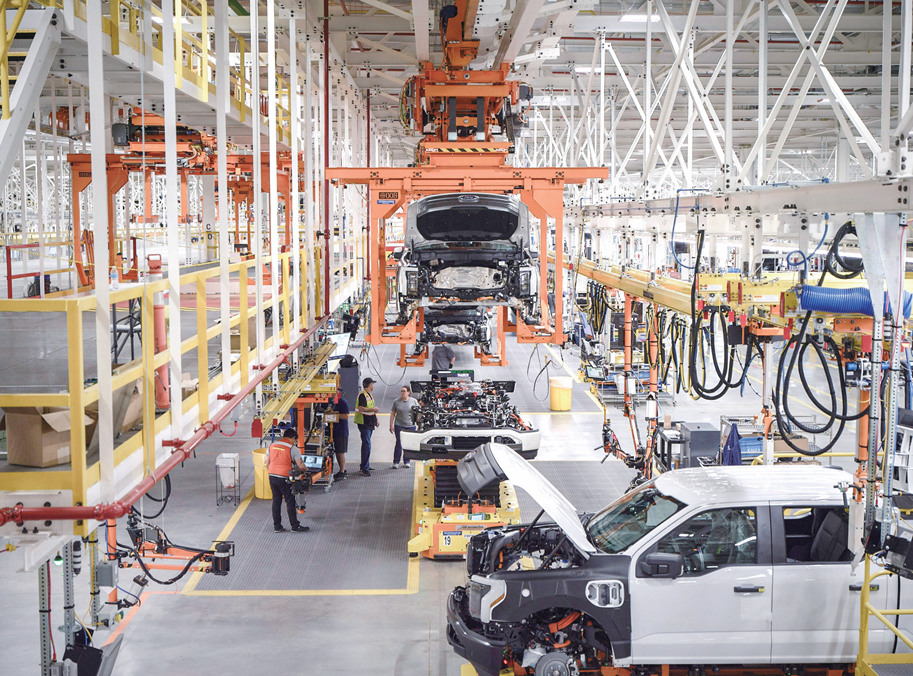Biden signed the "Inflation Act", and the US subsidy new energy hidden "exclude China"
Author:Global Times Time:2022.08.17
[Global Times Special reporter Li Yong, Li Yong, Global Times reporter Zhao Juezhang Shen Weizhong] U.S. President Biden plans to sign the "Inflation Act" on the 16th local time and speak. The United States CNN (CNN) said that after the bill takes effect, it will invest $ 430 billion for climate, clean energy, and medical care. At the same time, it will be committed to creating about $ 740 billion in fiscal revenue in the next 10 years. This one of the major party leaders of the Senate, Shu Mo, known as "the bolder climate plan in American history" by Democrats as a "bargaining chip" that increases the winning rate in the midterm elections. Another measure of "restricting China" — some analysts said that the intention of electric vehicle subsidy provisions proposed by the bill excluded China from the supply chain. However, it is not easy to achieve this goal. Some Korean media quoted people in the industry as saying that Chinese semiconductor, battery materials and other products are cost -effective, and it is not easy to change the trade structure in the context of global economic slowdown and geopolitical conflict. Chinese experts interviewed by a reporter from the Global Times on the 16th believe that the United States may be normalized in the future of China's specific industries through the form of industrial policies. Emphasizing globalization and free trade, but in recent years, it has actually carried out against globalization.
American media: Democrats want to tell voters that they are trying to control inflation
On August 7th and 12th, the long -delayed "Inflation Act" Act passed by the Senate and the House of Representatives in accordance with the party's position -Democratic support and Republicans opposed. According to the Washington Post on the 15th, Biden plans to sign the bill on the 16th and speak. CNN said on the 16th that the White House stated in a statement that in the next few weeks, Biden will visit the United States how to benefit Americans. He will also hold an event that celebrates the "Inflation Act" on September 6.
"This historic bill will reduce the expenses of energy, prescription medicines and other medical care of American families, and fight climate crisis, reduce fiscal deficits, and allow those large enterprises to pay taxes and fees they should pay." The White House published on the 15th on the 15th Said in the statement.
According to CNN, the Angle Act of Inflation will invest about $ 430 billion in fiscal expenditure and create a fiscal revenue of nearly $ 740 billion. In terms of expenditure, the bill will invest about 370 billion US dollars in the climate and clean energy field, and its goal is to reduce carbon emissions in 2030 by 40%(compared to 2005) in 2030. Agence France -Presse said that the bill will invest about $ 64 billion in the field of medical care, and its goal is to reduce the differences in medical care throughout the United States by controlling the price of prescription drugs. For some prescription drugs, federal medical insurance will receive bargaining power for the first time.
In terms of income, the "Angle Act Act" sought to levy a minimum tax rate of 15%to large companies with annual income of more than $ 1 billion.
"Another name of the" Angle Act "Act is called the Climate Act." Bloomberg, USA, said on the 16th that if someone asked why the upcoming bill is called the most important climate legislation in the United States, then this is this is It is understandable that its name can be simpler and intuitive, such as the "Clean Air Law" passed in the early years. "But today's political and public opinion situation requires legislature to guide the public debate to the direction of the initiator of the proposal." Bloomberg said that because inflation is a problem that many Americans are particularly worried at the moment, the "Inflation Act" The name is not surprising. As the midterm elections approach, Democrats want to tell voters that they are trying to control inflation.
American Council: The bill "clearly prevents" investment that supports China
The policies of clean energy and climate change have aroused widespread attention from international public opinion in the "Inflation Act". According to the United States Colombia Broadcasting Corporation (CBS), the relevant policies of the bill include the tax credits of $ 4,000 to Americans who purchase second -hand electric vehicles, and the purchase of new electric vehicles can get $ 7,500 tax credits. This Both stipulated aspects are low -income people.
In addition, the bill will invest $ 30 billion for production tax credits to promote the production of solar panels, wind turbines, and key mineral processing of US $ 10 billion; For example, facilities for manufacturing electric vehicles and solar panels.

Ford Ford Motor Company's assembly site map.
Many analysts believe that this bill means "targeting China". According to the Broadcasting Corporation and the Washington Post, the bill provides new subsidies for buyers of electric vehicles, but at the same time, new conditions are added. For example, cars must be manufactured in North America, and at least 40%of the batteries have metal raw materials and Minerals (such as lithium and cobalt) must minimize and refine countries that sign free trade agreements with the United States or the United States. "In other words, not in China," the United States connected website said. Mark Lavin, a member of the Democratic Party of Congress, wrote in the Congress on the 15th that the bill "clearly prevented" the investment in China. South Korea's "Asia Daily" said that related policies have formulated a more detailed framework for the purchase of American goods first. Some analysts said that this is the United States after the "Chip and Science Act" in the United States in China with high -tech and future development potential to China. Once again, it tries to exclude China outside the supply chain and reorganize the global supply chain centered on the United States. Lin Boqiang, Dean of the China Energy Policy Research Institute of Xiamen University, said in an interview with the Global Times reporter on the 16th that in the field of lithium battery manufacturing, China occupies a global leading position. Therefore "".
According to customs statistics, the export volume of lithium batteries in China in 2021 was US $ 28.428 billion, of which the United States became one of the most important export markets for lithium batteries in China for US $ 4.975 billion. However, a research report from Guolian Securities believes that considering that the supplier system of car companies is difficult to change significantly in a short period of time, it is expected that the US bill will not have a significant impact on Chinese battery exports in the short term. Lin Boqiang believes that the long -term impact of the "Afold Consolidation Act" may be that the scale of migration of lithium battery manufacturing enterprises in China may increase, and this will increase the cost of Chinese enterprises.
The provisions of electric vehicles in the US bill have also caused controversy in its country. According to the US CNBC website, supporters said that the new regulations will get rid of the dependence on foreign countries, especially China, and encourage domestic electric vehicles and batteries. However, opponents believe that pricing and procurement rules, especially key raw material procurement rules for car batteries are too aggressive, which may cause most electric vehicles to lose their qualifications to obtain federal government incentives, at least in the short term. The American Automobile Innovation Alliance stated that once the bill is implemented, 70%of electric vehicles currently sold in the United States will not be able to enjoy tax credit.
The Asian Daily stated that the restrictions on the "Inflation Act" for the supply chain of electric vehicles and battery supply also put a lot of pressure on Korean companies. On the one hand, some popular Korean brands in the North American market are exported to the United States after production in South Korea. The US bill will weaken the price competitiveness of Korean electric vehicles. On the other hand, China and South Korea have close cooperation in this field, and it is difficult for Korean manufacturers to rely on Chinese battery components and raw materials to find alternative supply chains in the short term.
"Global Clean Energy Competition Start"
In addition to "restricting China" in electric vehicles and batteries, Wei Frey, deputy director of the New Energy and Low -Carbon Development Research Center of China (Shenzhen) Comprehensive Development Research Institute, told the Global Times reporter on the 16th that the relevant content of the US bill is also obvious The intention of suppressing China's photovoltaic industry. However, he believes that the purpose of the United States is difficult to achieve. China's photovoltaic industry was the earliest raw materials, technology, and markets "three heads". With a huge market, China's photovoltaic industry can get enough support. Wei Frey also mentioned that the photovoltaic industry has high requirements for raw materials and cost control, while the United States is not very attractive in terms of cost.
The United States has different views on how the "Angle Act" will affect the competition of the United States and China in the energy field. The Wall Street Journal recently published an article that by investing 370 billion US dollars to promote green energy transformation, the United States actually gave energy leaders to China, because renewable energy requires a large number of key minerals, such as cobalt, nickel, manganese, lithium, lithium And China occupies obvious advantages in refining these minerals. The article is worried that Beijing will take mineral resources as a political weapon.
"Global Clean Energy Contest began." World Newspaper Cindyga said on the 15th that by double bets on forward -looking industrial policies, the United States suddenly became ready for competition with Europe, China and other countries. Last year, global investment in energy transformation exceeded $ 750 billion, and China invested only $ 266 billion, while Germany and the United States were US $ 47 billion and US $ 114 billion, respectively. The article believes that in this hardware manufacturing competition for energy transformation, China is far ahead. At present, China has produced more than 2/3 of the world's solar panels and lithium -ion batteries, as well as about half of the wind turbine.
Bloomberg said on the 15th that even if the United States invested about 370 billion US dollars in the field of climate and clean energy, the US green investment was still behind China. If public and private investment aimed at accelerating energy transformation, China is undoubtedly one of the countries with the largest energy expenditure. China has invested a large part of this part of the expenditure to the development of wind and solar energy.
- END -
"Party flags flutter at the grassroots level"!rainstorm!flood!"Police Blue" retrograde protection

On June 13, the police at the Period Police Station of the Public Security Bureau ...
Wenshui Personnel Dynamics
On August 17, Wenshui County held the ninth meeting of the Standing Committee of the 17th National People's Congress.Appointment: Lan Xiaoyan is the director of the Legal Working Committee of the Stan...